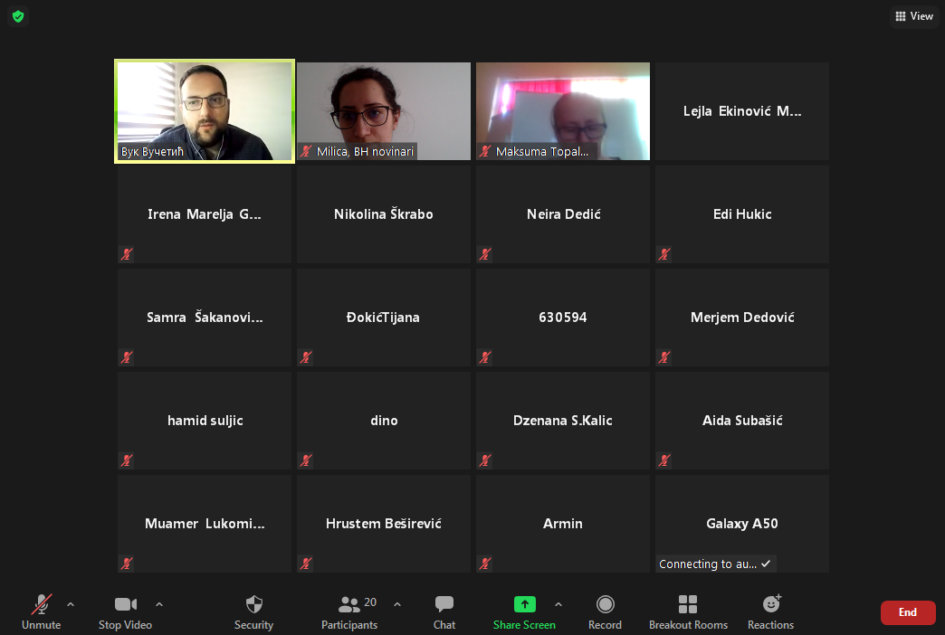
Sarajevo, 08.02.2021.- The media and media technologies permeate the entire society, which is why having basic knowledge about the role of new media technologies, but also the ability to critically think and question media content is a categorical imperative that is set before each individual in today’s social order. This was ordered during the workshop on media literacy for representatives of non-governmental organizations, which was organized by the BH Journalists Association through the Zoom platform.
Research shows that civil society organizations in Bosnia and Herzegovina have limited knowledge and capacity to advocate for and promote media literacy, as well as to educate citizens on how to recognize information manipulation, political censorship, and fake news. Due to the above, BH journalists decided to organize education of non-governmental organizations operating in local communities, in order to improve their capacities in the field of media literacy and motivate them to get involved in protecting free and independent media in their communities and protecting citizens’ access to objective and professional information.
Today’s workshop was attended by 20 representatives of non-governmental organizations from all over Bosnia and Herzegovina, and the educator was an expert in media literacy doc. dr. Vuk Vucetic.
Vučetić emphasized that media literacy encompasses a wide range of knowledge and competencies and that it is extremely important to know who is the author of a certain media content, having in mind the growing wave of fake news, misinformation and / or clickbait content in the 21st century.
“It should be borne in mind that different audiences interpret the same media content in different ways, as well as that certain common values can create a similar interpretation of media messages. By understanding the possibility of different interpretations, we are actually expanding our own horizons, which help us to accept different attitudes and opinions, which is certainly one of the key preconditions for the functioning of a democratic society in the broadest sense” Vucetic points out.
He added that one of the ways to develop awareness of the importance of media literacy is more intensive animation of decision makers in order to create systemic solutions in the context of media literacy development in schools and colleges, organizing workshops and seminars for various actors, and creating brochures, publications and research, areas of media literacy with the aim of enriching the existing literature.
Tijana Đokić from the Youth Association “Mobilijar” from Sokolac believes that the topic of education is completely current and necessary in everyday life and work in any activity, as well as within civil society organizations. “We are forced to continuously be part of the literacy process, to prepare for media appearances, to master knowledge from the media, even though we are not journalists, and to place the best possible information in the work and contact with stakeholders: beneficiaries of our projects, donors, associates, partners “, believes Đokić, adding that it is very important to learn and master the tools for increased security and safety on the Internet, and to work on developing critical thinking.
Workshop participants agreed that more intensive cooperation of the civil sector with traditional media and / or content creators on new social platforms is necessary, in order to produce specialized shows that will focus on media literacy, and thus work on educating citizens BiH.
This is the first in a series of workshops for the NGO sector in BiH on media literacy, organized within the project “Free Media for a Free Society”, implemented by the BH Journalists Association in cooperation with the Association of Electronic Media in BiH with the support of the European Union. The aim of this project is to strengthen independent and free journalism in local communities, and the application of European standards in the protection of freedom of expression and access of citizens to quality and objective information.



